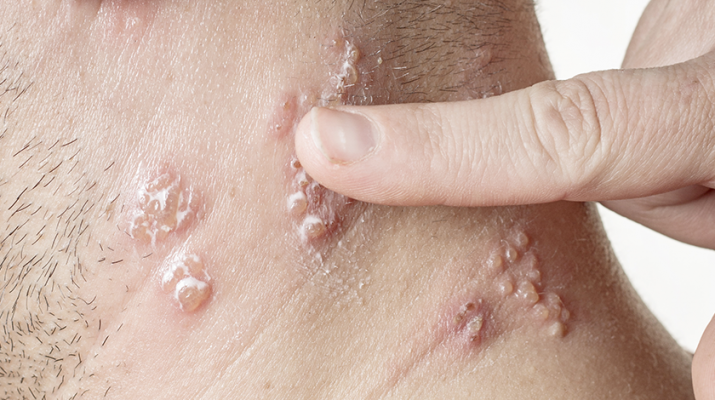For experts, it’s a no brainer. If you had chickenpox as a child and are over 50, you should get the vaccine
By Deborah Jeanne Sergeant

You faithfully receive your flu vaccination every fall, but have you thought about shingles?
If you’re like most people who had chickenpox as a child, you have a risk of developing shingles.
Most people who experience shingles do so around their 50s or 60s. That’s why physicians such as Lindsey Dolohanty, UR Medicine dermatologist and assistant professor of clinical dermatology at URMC, recommend that adults age 50 and older who have had chickenpox receive shingles vaccine.
People who have never had chickenpox should not receive shingles vaccine since they’re not at risk.
“Shingles is also called herpes zoster and occurs when the virus that causes chickenpox is reactivated in the body,” Dolohanty said.
She added that the only contraindications to the shingles vaccine include allergies to one or more of the components of the vaccine. These include gelatin or neomycin. The other contraindications are conditions or medication that suppress the immune system, such as chemotherapy drugs.
Local reaction at the injection site is the most common side effect. Some insurance plans cover shingles vaccination.
Shingles start out with a sensation of burning, pain or tingling in an area of the body, sometimes as a band, but only on one side of the body. Within two days, infectious lesions form (once they form a crust, the patient isn’t contagious).
“When patients have active blisters, they should seek care from their PCP or dermatologist and avoid direct contact with children during that time period to avoid spreading the virus to others,” Dolohanty said. “This is a population of patients who perhaps hasn’t had chickenpox or the chickenpox vaccine before.” People at higher risk for shingles have experienced chickenpox and currently have a depressed immune system because of stress, injury, medication or unrelated disease.
Elizabeth Arthur, dermatologist at Helendale Dermatology & Medical Spa in Rochester, had shingles last summer at age 53. The illness landed her in the hospital five days.
She advises patients to seek treatment for the disease within the first two days, since this tends to lessen its effects and reduce the risk of post-herpetic neuralgia, lifelong flare-ups in the same place manifesting lesions. About 20 percent of patients experience post-herpetic neuralgia.
“The pain afterwards can be debilitating,” Arthur said. “For me, it was the worst pain I’ve ever had in my life.”
Some describe it as burning, stinging, shooting pain in the skin that any slight contact sets off, such as clothing brushing against the skin.
Topical preparations can reduce pain at the site, while oral anti-viral medication can help reduce the duration and risk of post-herpetic pain.
The vaccine reduces patients’ risk of developing shingles by 50 percent.
“I wondered if it made a big difference,” Arthur said. “After having it, I’d say, absolutely. Even a mild case, if you can reduce it, isn’t that better?”
Vaccination can also help prevent the spread of illness to others who are not or cannot be vaccinated, such as yet-unvaccinated babies, who can develop chickenpox from an adult’s case of shingles.
Anyone approaching 50 should discuss shingles vaccination with a primary care provider.

